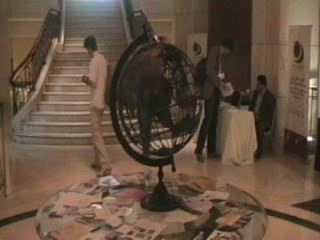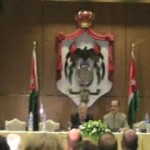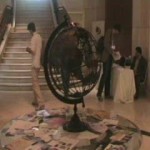Amman, 14th June of 2006
GLOBAL MEDIA WAR CONCERNING THE PRESENT MIDDLE EAST – AL JAZEERA, CNN AND THE OTHER MEDIA
PART 1
The topic of the following speech is the war of media in the time of globalization. This war will concern something else than a battle on the war military field, to conquer somebody. This war may describe a phenomenon which is conditioned by culture effects or competition between Western and Arab culture.
The purpose of the article is also not to explain, whether the real conflict between Western and Arab civilization exists or not. However if the war exists in the battle field between West and Arab world it does not mean that this war exists truly in the viewers mind. It is more important to indicate the expectation of media. It is necessary to show new trends in developing modern, global news agencies. In this article the subject of interest mainly focuses on information services.
My atricle also tries to explain the essence of global media conflicts, relations between West and the Middle East, especially in the Arab world. In my opinion to understand this clash it is important to put it in various different contexts.
The important question is the meaning of global media which are obviously linked to the issue of globalization. Media want to increase an amount of their viewers, most of them try to became globally available. However so called media war should not be treated in the same way as in a military conflict. In addition the international media confrontation is caused by cultural differences of viewers, existing stereotypes (in comparison to the national ones) but often it is analyzed in a positive way, more as a competition than a real hard conflict.
An American station CNN aspired to be a world station, not limited only to the American continent and territory of the United States. Similarly the pan-Arab station of Al Jazeera wants to increase their viewers in the global context. It is also a plan to develop three new bureaus of Al Jazeera International. In the case of Al Jazeera there is no analysis of the local situation in Qatar, the attention is given to pan- Arab issues or issues involved in global politics.
PART 2
The problem as well as some might say the blessing, is that some stations similar to international corporations are not public (controlled by the state) or ethnic. In contradiction to CNN, the Al Jazeera was unknown in Poland, the same in the West till approximately the beginning of 21st century.
Mohammed El-Nawawy, a professor at Queens University in North Carolina, describes in his book – `Al Jazeera: How the Free Arab Media Scooped the World and Changed the Middle East[1]` the Qatar station which was created in 1996 and became a pan-Arab station. It opened the Arab media a forum and created a new image of the Palestinian problems, involved in the issue of Arabic solidarity. In Poland some unclear information about Al Jazeera erupted after 2001, but it was rather connected with the issue of terrorism and the statement of Al-Kaida[2].
In some English-language Arab websites like tbsjournal.com, one may find an interesting analysis about American stations, including CNN which describes American campaign in the Middle East as a war with terrorism, but Al Jazeera describes it as so called `war with terrorism`. It is a big difference. Nevertheless in the West also in Poland, the Al Jazeera is called as an Arab version of CNN.
The question now is if media are an active biased participant in the conflict or an objective observer? During the conflicts there exists a danger that media may be the object of pressure by various group, lobbys or even military leaders. It is said that commercial media enjoy more independence, they are independent from the influence of particular states. But at the same time business groups have a strong impact on them.
During the war in Afghanistan and Iraq both in 1990 and 2003 American media were influenced by the government. The government put a strong pressure on news agencies. Relatively CNNs image as an independent station suffered the least in the media confrontation, among American stations which were perceived as biased in the world. It was caused by their involvement in the Middle East (Iraq, Afghanistan, Syria and other countries of the Middle East).
What else can we say about Al Jazeera, from the Polish point of view? Does anyone in Poland consider the situation of the war of media? Does the ethnic character of the station automatically causes conflicts with other stations, which nation is non-familiar with or perceive it as an enemy?
Nevertheless Polish people may be surprised that journalists of Al Jazeera are not popular with Arab authorities, whereas simultaneously the stations popularity increased to 40 mln viewers. If we compare both stations CNN and Al Jazeera (during the war in Iraq in 1990 and 2003) we will be sure that both stations have made an enormous capital. The Gulf War in 1990 caused the creation that is known in the world media as the `CNN effect`[3]. In contradiction to the war in Vietnam, American media supported the American military air campaign in 1990. It is true that for the first time in the history of media a complete image of war was shown, so real. However in the opinion of other researchers it described more of a reality closer to a game of Nintendo[4] than a real war full of cruelty which should cause rather our disregard towards the war. Nevertheless CNN created a new precedent which got the camera closer to the war events.
As far as the Arab world is concerned – it is necessary to mention that Arab people earlier watched only western global news service, like CNN or BBC World among others in 1990. That situation existed till moment pan-Arab transnational TV stations were created in the global context. Al Jazeera was set up in 1996.
Part 3
In contradiction to the Arab TV stations the war in Iraq was shown as a Battle for Freedom (Iraqi Freedom Operation). Some researchers tested the influence of CNN television on viewers submitting a group of people to a particular study. The subject of the research was a 20 min. spot from CNN concerning the entering American troops in Baghdad 9.4.2003 and the destruction of Saddam Hussein statue. The participants said that CNN showed the American troops as – ours. They described Iraqi conflict from 2003 as a media war – on the one hand the minister of Iraqi information Al-Sahaff and on the other hand the mouthpiece of Americans. Generally they expressed surprise that American troops that entered Baghdad did not face any opposition or fight, as if Saddam Hussein sold Iraq to Americans[5].
As far as media conflict is concerned I should also present Polish attitude toward issues that was most controversial. Specifically statements of bin Laden, showing kidnapers and their victims (Arabic side), and torture of prisoners in Abu Gharaib and Guantanamo as well as hidden information about war in the Middle East (Western side). Impressing violence, lack of moral context occur sometimes both in Western and Arabic TV stations. The question is, if these pictures we have treated as an effect of a media war or as an effect of commercialization where some pictures build bigger popularity for the world networks.
Viewers in Poland may think that media show these pictures without moral context. Hostility, desire to beat an enemy was sometimes stronger than the issue of indicating independent information by media. In the context of Abu Gharaib and Guantanamo it was lack of moral context and basic human rights. In the context of showing these pictures (Western side) was to offend Arab viewers, as far as other pictures from the Arab site (showing kidnappers and victims, statement about bloody Jihad) is concerned to give another argument that the West should be hated and punished. Desire to take revenge?
If global media are in dispute now the conflict also can be described as the Jihad vs. McWorld confrontation[6]. This conflict describes two fighting trends – one argument for a unification, universalization, standardization, and the second to underline its diversity and separateness.
Al Jazeera is described as the `Arab CNN`, but in fact aspires for the unity of the Arab world and the change of the Middle East. If we take the point that both stations are similar we have to cancel the argument about the war and the conflict between them and between media conglomerats in American – Arab context. Also an example of American film productions: `Fahrenheit 9.11` directed by Michael Moore (2004), `Control Room` by Jehane Joujaim and `Weapon of Mass Fraud` by Danny Schechter (2004).
It may be a competition between these two stations, but in the same sphere of `games`, it is a battle about the viewers. My argument is that the thesis about the competition between them is true. In this competition the media which are wining are the ones, which are more open, professional and which respect moral standards. In my opinion CNN and Al Jazeera, apart from some controversial issues may be perceived as positive phenomena in today`s news world media.
The paper was presented during WOCMES 2 – World Second Congress for Middle Eastern Studies, Amman
(11-16 June of 2006).
Polish presence during conference in the note of Embassy of the Republic of Poland in Jordan.
BIBLIGRAPHY:
Andrzej Kapiszewski, Native Arab population and foreign workers in the Gulf states. Social, economic and security issues, Krakow 1999.
Benjamin Barber, Jihad vs. McWorld: How Globalism and Tribalism Are Reshaping the World, 1995.
Bjørn Sørenssen, The Man on the Roof, the Children in the Shelter – Promising Possibilities and Repulsive Realities in Television News [in:] Wiesław Godzic, Aspects of audiovisual popular culture in Norway and Poland, Publication of the Jagiellonian University, Krakow 1999, p. 155-164.
Injy Galal, Amy Mowafi, and Lama Al-Hammouri, Operation Iraqi Freedom or Invasion of Iraq: Arab Interpretation of CNN and Al Jazeera Coverage of the 2003 Gulf War, http://www.tbsjournal.com/galal.htm
Mohammed El-Nawawy, Adel Iskandar, Al-Jazeera: How the Free Arab Media Scooped the World and Changed the Middle East, Westview Press, 2002.
See also:
Transnational Broadcasting Studies (tbsjournal.com) published by the Adham Center, The American University in Cairo, Egypt.
[1] Mohammed El-Nawawy, Adel Iskandar, Al-Jazeera: How the Free Arab Media Scooped the World and Changed the Middle East, Westview Press, 2002, p. 74.
[2] Polish society got more a clear information about Al Jazeera in 2003 due to the issue of the Polish involvement in Iraq and increased their attention towards the issues in the Middle East.
[3] `CNN effect` was subject of many analysies in Transnational Broadcasting Studies (tbsjournal.com) published by the Adham Center, The American University in Cairo, Egypt.
[4] `Nintendo Effect` was presented in the chapter of the book edited by prof. Wieslaw Godzic, Aspects of audiovisual popular culture in Norway and Poland, Publication of the Jagiellonian University, Cracow 1999. Bjørn Sørenssen presented a theory about so called `techno war` in the Gulf and `Nintendo Effect` in his article titled: “The Man on the Roof, the Children in the Shelter – Promising Possibilities and Repulsive Realities in Television News”. See also: War in the Gulf; Tourism Shaken By 'CNN Effect’, January 28, 1991, The New York Times, http://www.nytimes.com/1991/01/28/world/war-in-the-gulf-tourism-shaken-by-cnn-effect.html
[5] Injy Galal, Amy Mowafi, and Lama Al-Hammouri, Operation Iraqi Freedom or Invasion of Iraq: Arab Interpretation of CNN and Al Jazeera Coverage of the 2003 Gulf War, Transnational Broadcasting Studies (tbsjournal.com).
[6] Benjamin Barber, Jihad vs. McWorld: How Globalism and Tribalism Are Reshaping the World, 1995.
Article by: Marcin Pietrzyk


